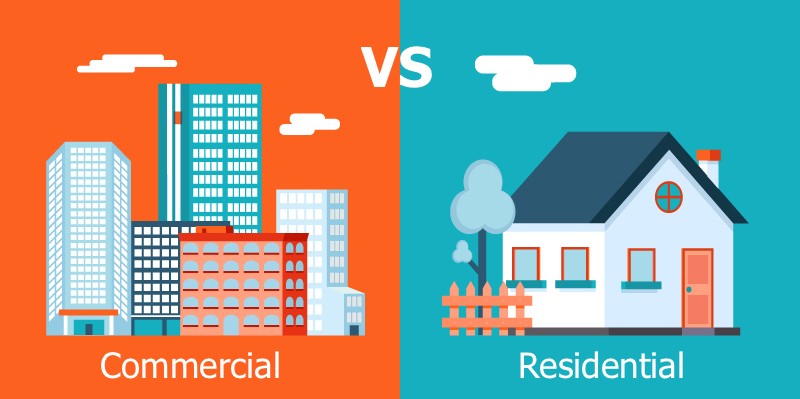When diving into the world of real estate investment, one of the first decisions to make is whether to invest in commercial or residential properties. Each type has its unique set of advantages, risks, and potential returns. Understanding the differences between these two investment avenues can help you choose the one that aligns best with your financial goals, risk tolerance, and long-term strategy.
In this article, we’ll break down the key factors that make commercial and residential real estate distinct, helping you determine which is the right fit for your investment portfolio.
Understanding Commercial Real Estate
Commercial real estate includes properties used for business purposes, such as office buildings, retail stores, warehouses, and apartment complexes with five or more units. Investors in commercial properties typically lease spaces to businesses or tenants for a fixed period, often ranging from three to ten years or longer.
Pros of Commercial Real Estate Investment:
- Higher Income Potential: Commercial properties usually offer higher returns than residential properties, driven by longer lease terms and higher rental rates.
- Diverse Tenant Base: A commercial property can house multiple businesses, spreading out rental income and reducing the risk associated with vacancy.
- Triple Net Leases: In many commercial leases, tenants cover property expenses (such as maintenance, insurance, and taxes), resulting in a steady cash flow for investors.
Cons of Commercial Real Estate Investment:
- Higher Initial Investment: Commercial properties tend to be more expensive than residential ones, often requiring larger capital commitments and financing.
- Complex Management: Managing commercial properties often requires more time, expertise, and resources. Commercial landlords may need specialized knowledge or hire professional property managers.
- Vulnerability to Economic Cycles: Demand for commercial real estate can fluctuate based on the economy. During downturns, businesses may downsize or close, increasing vacancy rates.
Understanding Residential Real Estate
Residential real estate involves properties designed for people to live in, including single-family homes, condominiums, duplexes, and smaller multi-family buildings (up to four units). These properties are typically leased to individuals or families for shorter periods, usually one-year leases or month-to-month arrangements.
Pros of Residential Real Estate Investment:
- Lower Entry Costs: Residential properties are generally less expensive than commercial properties, making them more accessible for individual investors and beginners.
- High Demand Stability: People always need housing, making residential real estate less sensitive to economic downturns. Rental demand typically remains steady, even during market fluctuations.
- Easier Financing Options: Lenders are often more willing to finance residential properties, and investors may qualify for favorable rates on conventional loans.
Cons of Residential Real Estate Investment:
- Shorter Leases and Higher Turnover: Residential leases are typically shorter, resulting in more frequent tenant turnover and potentially increased vacancy periods.
- Hands-On Management: Residential property management can be time-consuming, especially for single-family homes or small apartment complexes. Landlords may need to handle maintenance, repairs, and tenant relations themselves or hire a property manager.
- Lower Income Potential: Residential properties typically generate lower rental income compared to commercial properties and may have smaller profit margins.
Key Factors to Consider When Choosing Between Commercial and Residential Investment
- Investment Goals and Time Horizon
If you’re looking for higher immediate returns and have a long-term investment outlook, commercial real estate might be the better choice. Residential properties are often more suited for steady, incremental income with lower volatility, making them ideal for investors with shorter time horizons or those seeking a lower-risk investment. - Risk Tolerance
Commercial real estate generally has a higher risk profile due to economic sensitivity and vacancy risks, but it also offers higher income potential. Residential properties, while typically lower in income, offer a more stable and consistent demand, making them less vulnerable to economic shifts. - Management Resources
Commercial properties often require more intensive management, potentially involving professional property managers or asset management companies. Residential properties, on the other hand, may be easier for individual investors to manage, especially if they’re willing to handle day-to-day tenant relations and maintenance. - Capital Requirements
Commercial properties usually require a higher upfront investment, often demanding significant down payments and higher closing costs. Residential real estate, with its lower price point, can be more accessible, especially for new investors or those looking to finance their investment through traditional mortgages. - Tax Benefits
Both commercial and residential properties offer tax advantages, such as deductions on mortgage interest, depreciation, and maintenance expenses. However, commercial investors may benefit from additional tax deductions and credits, especially if the property is used for business or energy-efficient improvements.
The decision between commercial and residential real estate investment ultimately comes down to your personal goals, financial situation, and appetite for risk. Commercial properties can offer higher returns but require more capital and management expertise, making them well-suited for experienced investors with substantial resources. Residential properties, while potentially offering lower returns, provide stability and accessibility, making them ideal for new investors or those seeking a steady cash flow with lower risk.
Still unsure about which path is best for you? JP Property Investment is here to guide you. Our experienced team can help you assess your goals, weigh the options, and choose the ideal investment to meet your needs. Contact us today to explore your real estate investment opportunities and start building a portfolio tailored to your financial future.


